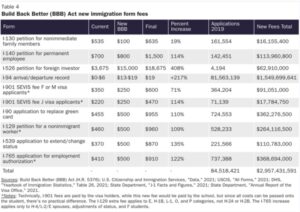On November 19, 2021, the House of Representatives passed the BBB Act by a vote of 220-213. All eyes are on the Senate for their consideration. The Senate is expected to begin deliberations in early December and vote before the holidays.
BBB would authorize the Department of Homeland Security (DHS) to temporarily provide legal status to any noncitizen in the United States, also known as parole. This includes both undocumented immigrants and legal temporary workers and their families who meet the bill’s eligibility criteria. Eligible candidates include those who have continuously resided in the U.S. before January 1, 2011. For naturalization purposes, “continuous residence” means that the applicant has maintained residence within the U.S. for at least five years before applying or resided continuously in the U.S. for three years in the case of qualified spouses of U.S. citizens. Anyone establishing residence after December 31, 2010 will be ineligible for temporary legal status.
DHS will begin accepting applications within 180 days after the date of enactment of the BBB Act. Thus, if the BBB Act were enacted on January 1, 2022, the first applications could be received by July 1, 2022.
So what exactly are the immigration benefits of the BBB Act?
Under this program, parolees would receive legal status and work authorization for the duration of the program. Individuals would be allowed to apply for state driver’s licenses. Anyone who is married to a U.S. citizen, the parent of an adult U.S. citizen, or the minor child of a U.S. citizen could immediately adjust their status to legal permanent residence after receiving parole because this status essentially removes the illegal entry bar to adjusting to permanent residence.
The Congressional Budget Office estimates that 6.5 million noncitizens would receive parole and that the provisions in the BBB Act would allow 7.1 million undocumented immigrants to apply. This would essentially protect undocumented immigrants from deportation and provide work permits to those who meet the requisite criteria and have lived in the U.S. since at least January 1, 2011. This is a significant portion of nearly 11 million undocumented immigrants living in the U.S. today.
What about employment-based green cards?
The BBB Act seeks to prevent green cards from being wasted in the future and thus Congress has established annual limits of 140,000 for employment-based and 226,000 family-based green cards. Prior to the BBB Act, any year in which the government could not process additional employment-based green cards before the end of that year, the green cards were lost forever. However, the BBB Act provides that any unused green cards will be rolled over automatically to the following year.
The BBB Act will also allow immigrants to file adjustment of status green card applications prior to a green card being “available” for them under the green card limits. Currently, immigrants cannot file adjustment of status applications until the priority date becomes current under the visa bulletin. Under the BBB Act, it would require the government to accept “early filed” applications for approved beneficiaries or family or employment-based petitions if they pay an extra fee of $1,500 and an additional $250 for each spouse and minor child. This ability to file early adjustment of status applications will allow applicants to receive employment authorization and travel documentation much faster than the current methods in place.
With this new immigration framework comes additional fees and changes to the current fee schedule, which is illustrated in the diagram below.

As we hope the BBB Act pushes through final approval in the Senate, we will continue to monitor the legislative development and provide updates in the future.
Sources:
https://www.whitehouse.gov/build-back-better/
https://www.forbes.com/advisor/personal-finance/build-back-better-act/
https://www.cato.org/blog/build-back-better-act-immigration-provisions-summary-analysis#_edn2
https://www.uscis.gov/citizenship/continuous-residence-and-physical-presence-requirements-for-naturalization

